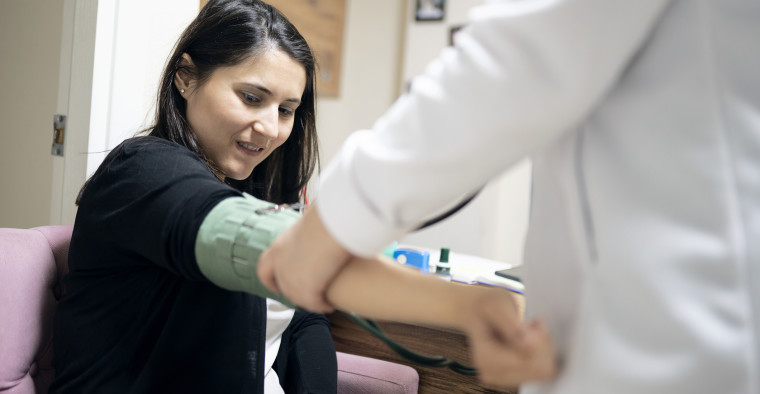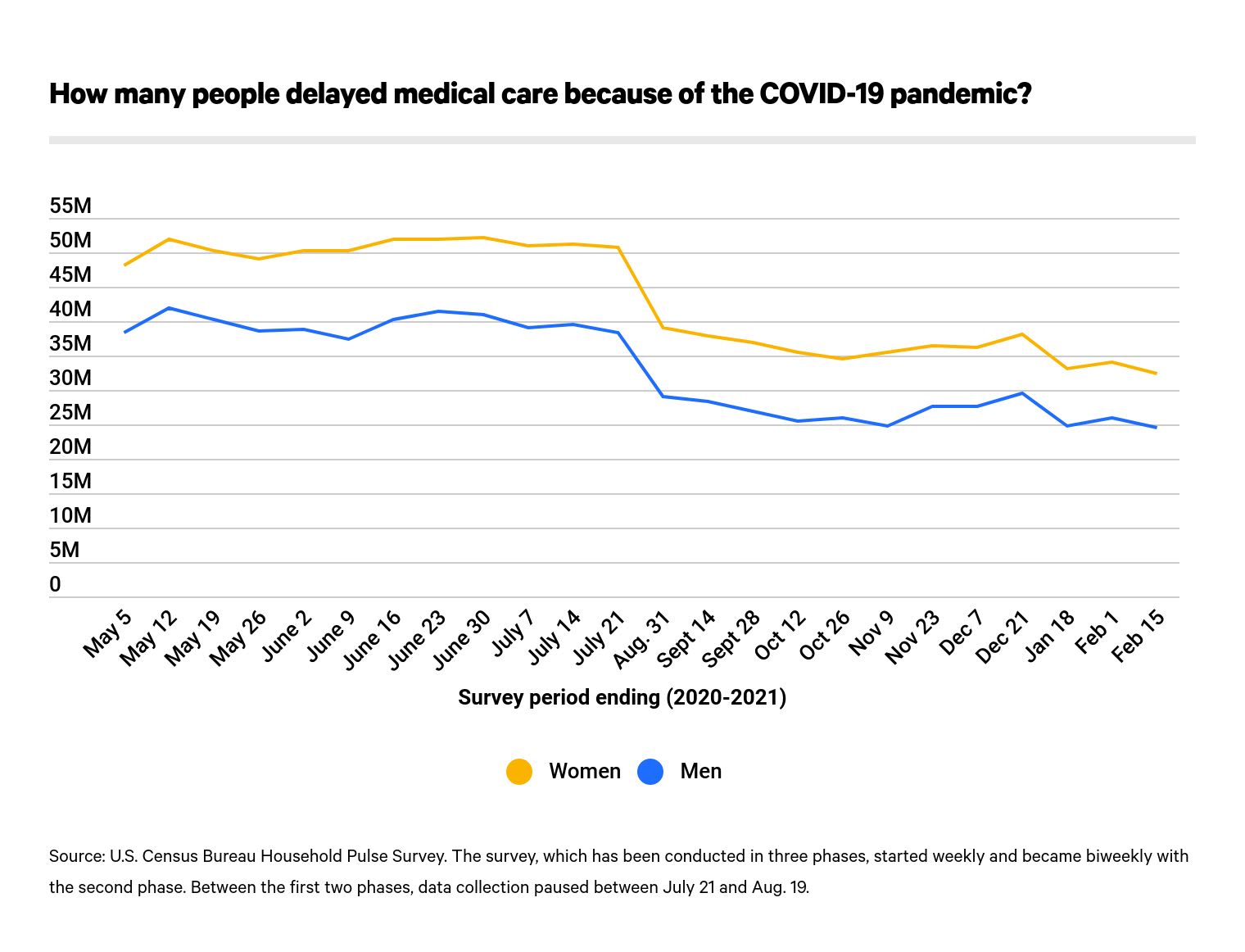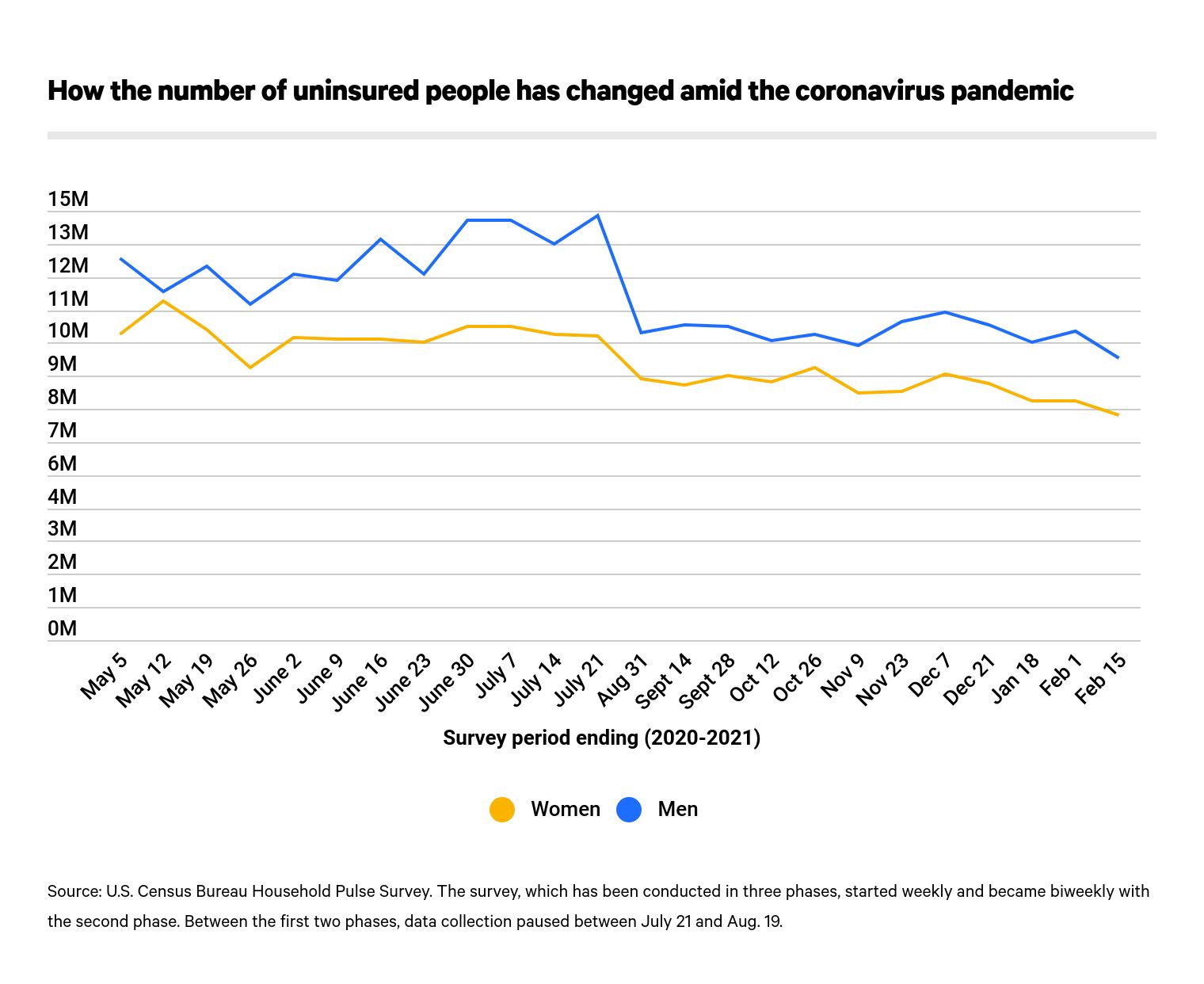Health Insurance
Women More Likely to Delay Medical Care During Pandemic

The coronavirus pandemic has forced millions of women to put off medical care. A ValuePenguin analysis of U.S. Census Bureau Household Pulse Survey data showed that more than 43 million women per polling period since April 2020 have delayed medical care in the prior four weeks because of the COVID-19 outbreak.
In fact, women were far more likely than men to avoid care because of the pandemic. The latest data reveals that among all 50 states and the District of Columbia, the number of women in the latest survey period — Feb. 3 to Feb. 15 — who avoided medical care outnumbered men in 49 states and D.C. The gap was largest in California.
Although many women avoided medical care during the pandemic, data suggests that it wasn't because they didn't have access to health insurance. The number of uninsured women fell by more than 2.7 million from April 2020 to February 2021. However, the number of uninsured women remained significantly high in a handful of states. In Texas, for example, the most recent estimates show that one in five women remain uninsured.
Key findings
- More than 43 million women per polling period say they’ve delayed medical care because of the coronavirus pandemic.
- In California, 1.1 million more women than men have delayed medical care because of the pandemic in the past four weeks. This is the largest care gap by gender in the country.
- The number of uninsured women has fallen by more than 2.7 million amid the pandemic. It reached a high of more than 11.4 million in early May 2020 before settling at nearly 7.6 million in February.
- Although the number of uninsured women dropped during the pandemic, more women have lost coverage than gained in eight states. Insurance coverage among women fell by 4% in Nevada — the state with the largest negative change.
- While the number of uninsured women in Texas dropped during the pandemic, the Lone Star State still has the highest proportion of uninsured women of any state.
10.1 million more women than men per polling period have delayed medical care because of the COVID-19 outbreak in the past 11 months
Over the 24 Household Pulse Survey periods since April 2020, 43 million women per cycle said they’ve put off medical care in the prior four weeks because of the pandemic. The number of women who avoided care reached its high point at the end of June, when 52.2 million women said they postponed care in the previous four weeks.
Women have been far more likely than men to avoid medical care amid the pandemic, as the number of women averaged 10.1 million more per polling period than men. Additionally, the highest number of women who put off care in one polling period outnumbered the comparable figure for men by 10.3 million.

At the same time, an average of 33.6 million women per polling period needed medical care but didn’t get it due to another reason other than the pandemic. Again, women were more likely to put off needed medical care than men, as an average of 7.7 million fewer men than women per period elected not to receive care.
Women who avoided care in the past four weeks outnumbered men in all but two states.
The most recent Household Pulse Survey period from Feb. 3 to Feb. 15 revealed that women still remain much more likely to put off medical care because of the pandemic. A total of 32.3 million women deferred medical care because of the virus in the past four weeks, while 24.5 million men said the same.
Including the District of Columbia, more women than men put off medical care because of the pandemic in all but two states: Idaho and Washington. Generally, 151,000 more women than men per state said they put off care in the past four weeks because of the COVID-19 outbreak. In California, the gap was the largest.
In California, 1.1 million more women than men put off medical care in the past four weeks. In 23 states besides California, at least 100,000 more women than men delayed medical care. In seven states (California, Texas, Pennsylvania, New York, Illinois, Florida and Ohio), the total number of women who put off care in the past four weeks eclipsed 1 million — although it’s important to note that these are the states with the highest populations.
Difference between men and women seeking medical care
State | Women | Men |
|---|---|---|
| California | 4,712,093 | 3,647,598 |
| Texas | 2,750,422 | 2,011,335 |
| Pennsylvania | 1,246,767 | 783,484 |
| Virginia | 950,135 | 564,714 |
| New York | 1,948,742 | 1,612,272 |
| Maryland | 683,352 | 374,536 |
| Illinois | 1,101,156 | 812,326 |
| Missouri | 594,623 | 306,266 |
| Georgia | 839,050 | 598,627 |
| Alabama | 548,849 | 316,063 |
| South Carolina | 584,760 | 354,337 |
| Florida | 1,890,265 | 1,673,349 |
States are ordered according to the gap between the number of women and men who put off medical care in the previous four weeks due to the pandemic. Negative numbers mean more men than women put off care.
2.7 million more women have health insurance now than at the beginning of the COVID-19 outbreak in the U.S.
ValuePenguin also calculated the number of women who lost access to health care over the course of the pandemic. Despite the unprecedented economic effects wrought by the coronavirus pandemic, there are fewer uninsured women right now than there were at the start of the survey period. There are now 2.7 million more women with health insurance coverage than there were in April 2020.
While more men than women regained their health insurance since April, the maximum number of uninsured women was lower than the high point for men. In the beginning of May, there were 11.4 million uninsured women. This means that the overall reduction of the number of uninsured women from the start of the survey period to now equals 24% of its peak. This also happens to be the same proportion as it was for men, whose peak happened in mid-July.

In 8 states, more women lost health care coverage over the course of the pandemic than gained it
While women overall have gained health care coverage since April 2020, the number of people without health insurance in eight states is now greater than it was at the beginning of the pandemic, led by Nevada. In the Silver State, there are 4% more uninsured women than there were in April. This amounts to a growth of 16,000 uninsured women since the start of the pandemic.
On the other side of things, fewer women lost coverage than gained it in some states — but, even so, the number of covered women was paltry compared to the overall population. For instance, one in five women in Texas remains without health insurance, even though the number of uninsured women dropped by 6%. In all, at least 10% of the population of women in 13 states are uninsured.
One contributing factor to the high number of uninsured women in these states is the lack of access to Medicaid and affordable health insurance. In 10 of these states, expanded Medicaid — which enables residents who make at least 138% less than the poverty level to qualify for coverage and enroll in Medicaid — hasn't been adopted or implemented.
State | Uninsured women | Expanded Medicaid? |
|---|---|---|
| Texas | 20% | No |
| Georgia | 16% | No |
| South Carolina | 15% | No |
| Oklahoma | 14% | Yes |
| Wyoming | 13% | No |
States are ordered according to the percentage of women who are uninsured relative to the entire population of women in the state.
Methodology
ValuePenguin analyzed data from the Census Bureau's Household Pulse Survey, which has been conducted since April 23, 2020.
In phase one of the survey — April 23 to July 21 — data was presented weekly. In phase two — Aug. 19 to Oct. 26 — and phase three — Oct. 28, 2020, to Feb. 15, 2021 — data was presented biweekly.
Mentions of the most recent period cover Feb. 3 to Feb. 15, although the survey is expected to continue through March 1.
